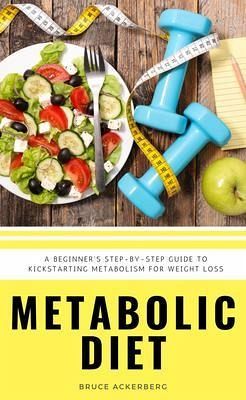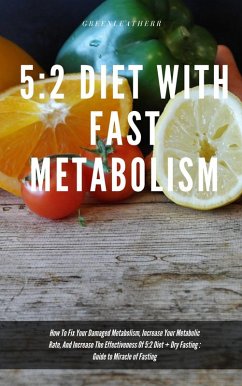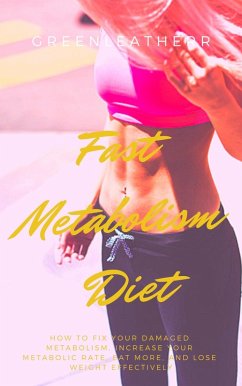
Metabolic Diet : A Beginner's 4 Week Step-by-Step Guide To Increasing Metabolism For Weight Loss (eBook, ePUB)
Includes Recipes and a 7-Day Meal Plan
Sofort per Download lieferbar
3,99 €
inkl. MwSt.

PAYBACK Punkte
2 °P sammeln!
Welcome to the ultimate guide to metabolic diets!Congratulations on taking the first step towards a healthier lifestyle. Whether you're looking to shed a few extra pounds, increase your energy levels, or simply improve your overall well-being, the metabolic diet may be just what you need. In this guide, you'll learn everything you need to know about the metabolic diet, including its benefits, how it works, and how to get started.First things first, what is a metabolic diet? Essentially, it's a way of eating that focuses on speeding up your metabolism. Your metabolism is the process by which yo...
Welcome to the ultimate guide to metabolic diets!
Congratulations on taking the first step towards a healthier lifestyle. Whether you're looking to shed a few extra pounds, increase your energy levels, or simply improve your overall well-being, the metabolic diet may be just what you need. In this guide, you'll learn everything you need to know about the metabolic diet, including its benefits, how it works, and how to get started.
First things first, what is a metabolic diet? Essentially, it's a way of eating that focuses on speeding up your metabolism. Your metabolism is the process by which your body converts food into energy. The faster your metabolism, the more calories you'll burn throughout the day. This can lead to significant weight loss, as your body uses its fat stores for energy instead of storing them for later.
So, how does it work? The metabolic diet is all about eating the right balance of macronutrients (carbohydrates, protein, and fat) to keep your body in a state of ketosis. Ketosis is a metabolic state in which your body uses fat for energy instead of carbohydrates. By keeping your carbohydrate intake low and increasing your fat intake, your body will enter this state of ketosis and start burning fat for energy.
Of course, like any diet, there are some foods you should avoid on a metabolic diet. These include processed foods, sugary drinks, and high-carbohydrate foods such as pasta and bread. Instead, you'll be focusing on whole, nutrient-dense foods such as lean protein, healthy fats, and low-carbohydrate vegetables.
But don't worry; a metabolic diet doesn't mean you have to give up all your favorite foods. There are plenty of delicious recipes and meal plans available that will keep you satisfied and on track. And, because a metabolic diet is all about balance, you can still enjoy the occasional treat without throwing your progress off track.
In this guide, we will talk about the following:
What is a metabolic diet guide good for?
Symptoms of gaining weight
Causes of Gaining Weight
Lifestyle Changes for Gaining Weight
Medical Treatments for Gaining Weight
Principles of a Metabolic Diet
Benefits and Disadvantages of a Metabolic Diet
3 Phases of a Metabolic Guide
Sample recipes of kimchi dishes
So, why should you consider a metabolic diet? For starters, it's a proven way to lose weight and improve your overall health. It can also be a great option for those with type 2 diabetes, as it can help improve insulin sensitivity and reduce blood sugar levels. And, because a metabolic diet is all about balance and nutrition, it can be a sustainable way of eating for the long term.
Congratulations on taking the first step towards a healthier lifestyle. Whether you're looking to shed a few extra pounds, increase your energy levels, or simply improve your overall well-being, the metabolic diet may be just what you need. In this guide, you'll learn everything you need to know about the metabolic diet, including its benefits, how it works, and how to get started.
First things first, what is a metabolic diet? Essentially, it's a way of eating that focuses on speeding up your metabolism. Your metabolism is the process by which your body converts food into energy. The faster your metabolism, the more calories you'll burn throughout the day. This can lead to significant weight loss, as your body uses its fat stores for energy instead of storing them for later.
So, how does it work? The metabolic diet is all about eating the right balance of macronutrients (carbohydrates, protein, and fat) to keep your body in a state of ketosis. Ketosis is a metabolic state in which your body uses fat for energy instead of carbohydrates. By keeping your carbohydrate intake low and increasing your fat intake, your body will enter this state of ketosis and start burning fat for energy.
Of course, like any diet, there are some foods you should avoid on a metabolic diet. These include processed foods, sugary drinks, and high-carbohydrate foods such as pasta and bread. Instead, you'll be focusing on whole, nutrient-dense foods such as lean protein, healthy fats, and low-carbohydrate vegetables.
But don't worry; a metabolic diet doesn't mean you have to give up all your favorite foods. There are plenty of delicious recipes and meal plans available that will keep you satisfied and on track. And, because a metabolic diet is all about balance, you can still enjoy the occasional treat without throwing your progress off track.
In this guide, we will talk about the following:
What is a metabolic diet guide good for?
Symptoms of gaining weight
Causes of Gaining Weight
Lifestyle Changes for Gaining Weight
Medical Treatments for Gaining Weight
Principles of a Metabolic Diet
Benefits and Disadvantages of a Metabolic Diet
3 Phases of a Metabolic Guide
Sample recipes of kimchi dishes
So, why should you consider a metabolic diet? For starters, it's a proven way to lose weight and improve your overall health. It can also be a great option for those with type 2 diabetes, as it can help improve insulin sensitivity and reduce blood sugar levels. And, because a metabolic diet is all about balance and nutrition, it can be a sustainable way of eating for the long term.
Dieser Download kann aus rechtlichen Gründen nur mit Rechnungsadresse in A, D ausgeliefert werden.













